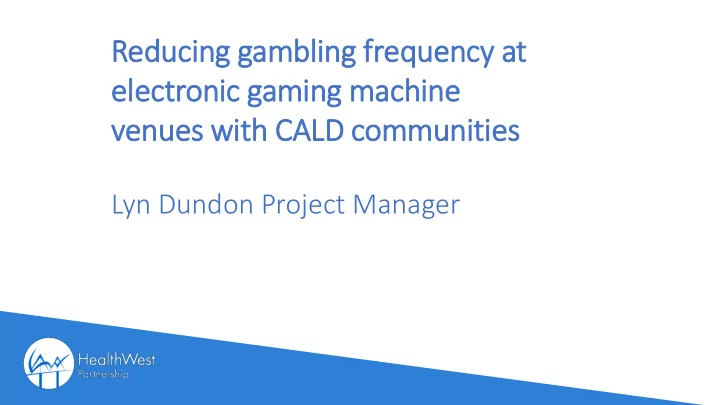

Reducing gambling frequency at electronic gaming machine venues with CALD communities Lyn Dundon Project Manager
Target Population Target population • Older Victorians from culturally and linguistically diverse communities Priority settings • Community and social senior groups • Venues with electronic gaming machines “the pokies” Clubs, Pubs, Hotels and the Casino
Where are the Electronic Gaming Machines? • North and West Metro Region • LGAs with the most EGMs tend to experience the greatest gambling losses • Areas of great disadvantage • Most culturally diverse
Public Health Preventative Approach Tertiary Actions Secondary Actions Primary Actions Short term, problem specific Aims to reduce the progression of harm Support factors that create health not just Individual-based interventions from gambling treating illness Individual responsibility Targets at-risk communities Focuses on the community not individual Gamblers help counselling Education - understand how electronic Maintain social inclusion irrespective of race gaming machines (pokies) work & the harm or gender, employment, education and they can cause to communities housing choices Behavioural risk-factor approaches Work with broad vulnerable communities at Develop recreational and educational (e.g. self-exclusion and individual risk (e.g. elderly, migrants, refugees, activities that are accessible and equitable, limits) students, trades men) related to ability and life stage within local communities Financial counselling Promote alternative low cost recreational Legislate to contain EGM industry; activities maximum bet level; number of machines; gaming venues hrs of trade Victorian Responsible Gambling Campaigns and advocacy that report Foundation campaigns Bet Regret, harmful effects of gambling on the Safer Gambling App community
llaborative Partnerships Coll Borderlands Migrant Cooperative Maltese Macedonian Resource & Council of Welfare Centre Victoria Greenstock Association North West Evaluation COASIT Ethnic Australian Council of Arabic Communities Greek Italian Welfare Council of Welfare Associations Incorporated Victoria Society in Australia
A Public Health Approach Gambling Industry Preventive Approach Economic and Social factors Vulnerability What are the What is our duty of What contributes strengths in our care to senior group to good health? communities? members?
The process Literature Training and Project Training Key Ethnic and Data Evaluation Advisory bi-lingual Groups Review Plan Group workers Promoting Engage Focus groups Ethnic and Bus trip alternative community and public Social Media survey recreation leaders forums
Project Advisory ry Team and training bi bi-lingual workers
Resources This training manual is designed to raise awareness and reduce the frequency of gambling in culturally and linguistically diverse (CALD) communities in Victoria. Social Outings Guide summary is now also available in 17 languages. Community and planned activity guide. Support for Planned Activity Group and community group coordinators in Melbourne‘s west to plan and organise activities.
Promotion of f Alt lternative Recreational Activities & Key Messages
Inputs & Reach In Bi-lingual worker, Discussion with senior Number of ethnic Total membership of community representatives leaders of ethnic associations/groups senior and senior managers associations/ groups leaders represent groups/associations Australian Greek Welfare 15 15 1,700 Society Council of Italian 60 60 8,000 Associations in Australia Migrant Resource Centre 10 5 320 N&W Metropolitan Region Maltese Council of Victoria 37 37 1,800 Arabic Welfare Incorporated 6 5 107 Macedonian Welfare 36 37 1,480 Association
Outcomes • Increase knowledge about gambling harm • Agencies have developed stronger & proactive relationships with community leaders promoting alternative recreation to EGM venues • Peak ethnic agencies are now aware of current research, experts, campaigns and resources for their communities • Healthwest has a stronger relationship with six new partner organisations
Collective Im Impact Phase 1 Phase 11 Phase 111 Phase IV Components for Generate Ideas and Initiate Action Organise for Impact Sustain Action Success Dialogue & Impact 4-6 months 6months- 1 year 2 years 5 years Convene Community Identify champions Create infrastructure Facilitate and refine Governance & stakeholders Form cross-sector (backbone process) Infrastructure group Dialogue about community Map the landscape Create common agenda Align goals and Strategic issues, context and Use data to make case (goals and strategy) strategies Planning resources Facilitate continual Facilitate community Engage community and Continue engagement Community outreach specific to goal outreach build public will Conduct advocacy Involvement Determine if there is Analyse baseline data Establish shared Collect, track and consensus/urgency to move Identify key issues and indicators, report progress Evaluation & forward gaps measurements and Improvement approaches
Where to next xt? • Forum with CALD leaders and local government – September 2015 • Celebration with peak CALD organisations in RGAW – October 2015 • National Alliance for Gambling Reform – October 2015 • VRGF Funding – December 2015 to June 2017 • Evaluation & Research – 2016 & 2017
Recommend
More recommend